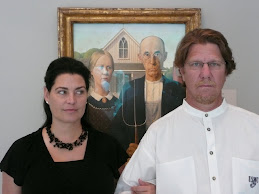As a newly-formed Christian Missionary team, my wife Heidi and I recently did what one would expect: We went to London for a conference. Sure, I know—you think we should be wearing hair shirts and introducing Aboriginal cave dwellers to the wonders of iron tools and phonics, but this was a conference we needed to attend. (Plus, we saved up for it, and it sounded like fun.)
Anyway, we went to London, and did a little touring while we were over there, and I took a few notes on life in the United Kingdom—through the eyes of a good Christian, of course. Perhaps these notes will be of use to you at some point:
1) England offers proof-positive that God has a plan for each of us. One need only enter a “round about” driving on the wrong side of the road during rush hour and emerge alive to know there is a Higher Power watching out for you-- and for some reason He must want you alive.
2) London gives one a true perspective on the Bible’s words concerning the finite value of money. This is because a week in London makes all your money go away.
3) The UK’s beers are a bit different, and it is very un-Christian to ask the pub owner which one he recommends, then shout, “Awwwwrgghhh!” as soon as you sip it. In order to develop a taste for their beer prior to leaving, you should buy some Sam Adams dark ale, open the bottles, let them sit on the kitchen counter at room temperature for one week, then enjoy.
4) Scotland offers a wonderful opportunity for witnessing on the Gospel of Jesus, as the Church of Scotland is in dreadful shape. You will want, however, to learn the Scottish accent before going. You and your travel partner can practice it by stuffing your mouths with peanut butter and hay, then singing opera songs to each other.
5) And finally, as a matter of foreign relations, know this: No matter where you are in the U.K., it is bad form to thank them for supporting us in Iraq, then commenting “but you did owe us one for winning WWII for you.”
While in the UK, however, we did do more than take these important cultural notes and sample warm, flat beer. Namely, we attended a conference.
Hosted by Holy Trinity Brompton (HTB), an Anglican Church in London, the conference was entitled “What Does the 21st Century Church Look Like?” The conference was attended by clergy from around the world (including a few from the US), all of whom were hoping the answer to the above question isn’t “Empty.” This is said only half in jest, as the attendance and participation in the Church of England is plummeting every year—and worse yet, Sunday’s at England’s Anglican Churches look like a Who concert compared to Scotland’s Presbyterian Churches.
So what’s to be done?
HTB offered some wonderful ideas. In outlining these ideas, however, it’s important to understand HTB’s primary audience is other UK churches, most of which are very, very traditional. Typically they offer a blistering schedule of activities, including 8am Communion, 10 am Communion, and, well, we beseech thee to returneth next week. Forget not to tithe.
Amazingly, this fun-filled formula doesn’t result in young people streaming in the door to investigate God’s Truth. And if youth don’t attend your church, then time, biology and mathematics will ensure that at some point, your church will in fact be empty.
So…what were some of HTB’s ideas for energizing a church?
1) Look out, not in. You know that sweet little old lady who sits on the front row at 8am communion? She gets it…she’s already a Christian. You can’t spend all your time trying to keep her happy by keeping everything the same. You need to look outward, because that’s where you’ll find lost people searching for meaning in their lives. In short, quit being so comfortable preaching to the choir.
2) Make worshipping God fun. Yes, it’s outrageous, but most twenty-somethings these days don’t want to sit in a church full of thees, thous, and organ music. So you can either ignore them (those ungrateful ruffians), or create a service they’ll find engaging-- one with modern language, life-relevant sermons, and loud, rock n’ roll praise music.
3) Remember Non-believers become Believers only after hearing. As a general rule, God doesn’t spend His days chasing down Non-believers and hurling conversion thunderbolts at them. And since Non-believers aren’t usually searching for a Bible study to join, there’s an impasse.
So what can be done? Churches need to host events that attract Non-believers because they sound not like church events, but, uh, actual fun. In time, and with God’s help, these Non-believers will come to see first-hand that Christians aren’t all Kool Aid guzzling zealots…that perhaps there is something to what Christians believe…and that perhaps those beliefs warrant investigation.
Why, you’re wondering, am I telling you this? After all, the chances are slim that you’re the Rector of a church. Let me give you an analogy used by Nicky Gumbel, the creative force behind the ALPHA program: Most churches, he says, are like a college basketball game: 10,000 people desperately in need of exercise watching 10 people desperately in need of a rest.
The point, of course, is that if you’re just watching, you’re not participating. So consider pitching in-- help the Rector and his/her staff create some fun new programs; or get an ALPHA course going in your church; or help orchestrate a Sunday evening “young persons” service; or volunteer for existing outreach programs. Chances are your church staff doesn’t have time to do all this new and additional stuff by themselves, and they’d love to have your help.
In closing, let me relate a story told by The Holy Trinity Brompton Vicar, Sandy Millar, which emphasizes the importance of our individual roles: There was, it seems, a church parishioner who was upset by the fact she’d been visiting a friend in the hospital, but no one from the church staff had been by. She relayed her feelings to the Rector, and ended by saying, “I just think someone from the church needs to go see her.”
To this, the Rector wisely replied, “Well, it sounds to me like someone from the church has already gone by to see her.”
Wednesday, February 17, 2010
Subscribe to:
Post Comments (Atom)



No comments:
Post a Comment